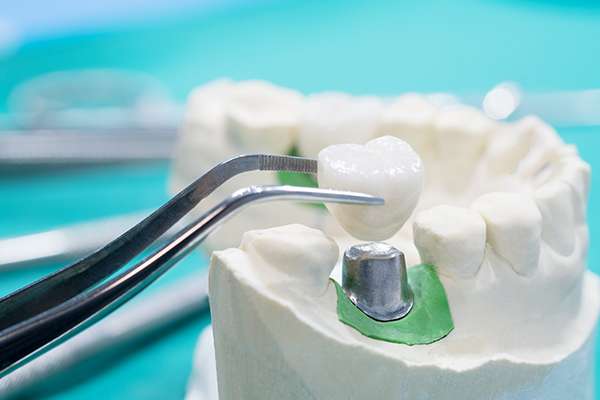How Long Your Dental Crown Will Last

Dental crowns are a great way to restore, renew and replace teeth that are in bad shape or completely missing. However, they have to last in order for them to do their job. While dental crowns are permanently placed, there is the potential for them to fail later on down the line. Additionally, accidents or damage to the crown can jeopardize how long they last. Ready to find out more about the lifespan of dental crowns?
How long do dental crowns last?
The following information outlines what to expect in regards to the lifespan of a dental crown. Keep reading to learn more!
The average
On average, dental crowns are said to last up to 15 years. However, this number tends to vary based on the type of dental crown. Modern-day dentistry has allowed for the evolution of porcelain dental crowns, which are said to be the most popular and one of the strongest. Originally, the only type of dental crown that was available was made of gold or metal alloys. Today, gold crowns still tend to last a while. However, certain metal alloy ones are known to fail within 10 years or so.
Associated factors
Outside of the average, there are a lot of factors that play into how long a dental crown will last. Patients that grind their teeth at night are a lot more likely to need a crown replacement within a couple of years, as opposed to 15. Additionally, those who eat tough meats or sticky candies are also a lot more likely to experience a broken crown within the first few years of placement.
Patients that avoid certain habits such as nail-biting or jaw-clenching have a better chance of maintaining their dental crown for 15+ years. In some cases, dental crowns can even last 20-30 years, however, it is solely dependent on the patient's oral hygiene and eating habits.
Ways to make dental crowns last longer
There are a lot of things that patients can do to make their dental crowns last longer than the average of 15 years. First and foremost, oral hygiene is the most important thing. Brushing after every meal and flossing at least once a day can help ensure that the crown remains in good shape. Good oral hygiene helps contribute to oral and dental health.
Secondly, it is best to avoid using teeth for anything other than eating. A lot of people have a bad habit of biting their nails or using their teeth to open bottle caps. Both of these habits can lead to a broken dental crown, which disrupts the goal of making it last. Aside from chewing on inedible items, it also important to be extra careful with the foods that are consumed. Avoiding meats with bones and especially sticky things like gum or taffy can ensure a long-lasting dental crown.
Reach out today!
Any questions or concerns regarding dental crowns and their lifespan should be addressed by a dentist. Reach out today to learn more or to get started with a dental crown procedure.
Request an appointment here: https://familychoicedentistry.com or call Family Choice Dental at (505) 634-5657 for an appointment in our Albuquerque office.
Check out what others are saying about our services on Yelp: Read our Yelp reviews.
Related Posts
Oral cancer screening is an essential preventive measure in maintaining overall oral health. The early detection of oral cancer can significantly improve the chances of successful treatment and recovery. As a general dentist, it is vital to inform patients about the importance of regular oral cancer screenings and how these screenings can help identify potential…
Considering a smile makeover and not sure where to start? Read on to learn more. Many people avoid smiling due to dental imperfections. A smile makeover may be the answer. A dentist can improve your smile with cosmetic procedures like teeth whitening, bonding, and veneers. The right professional for the treatment is the key to…
Sometimes, it takes more than one procedure to get the smile of your dreams. A dental provider can create a custom plan called a smile makeover to enhance different aspects of your smile. It is best to ask a provider if a smile makeover is right for you, as they can give personalized professional advice.…
If your teeth are spaced irregularly, you might not have great self-esteem and may consider trying teeth straightening. Plus, the issue might change your oral hygiene habits. One reason is that food might get stuck in them and be difficult to remove. That can weaken the teeth and gums, leading to complications. Keep reading to…
